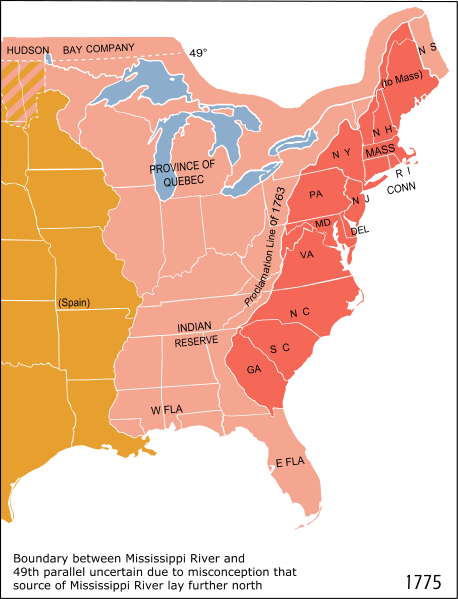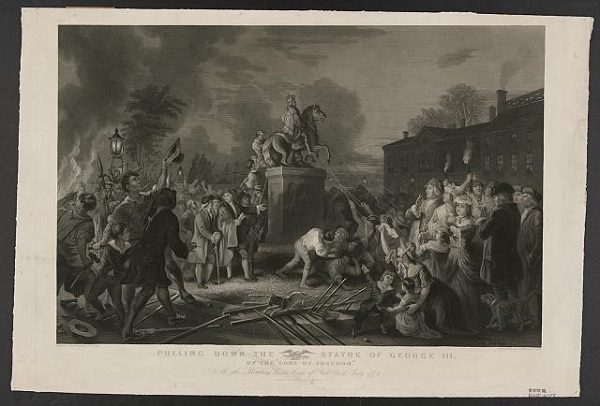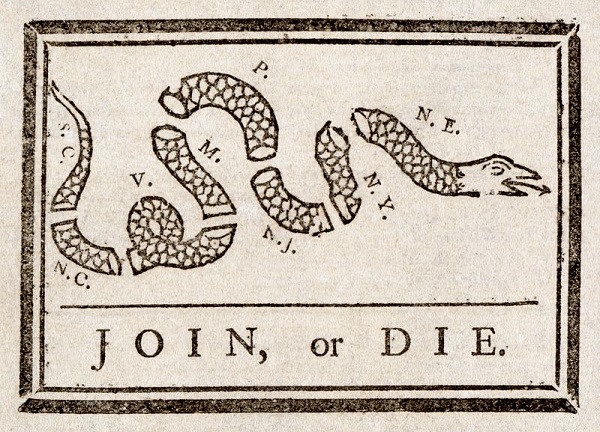The 13 colonies was one of the many nations that fought in the Revolutionary War in the late 18th century.
The 13 colonies were established in North America by Great Britain during the 17th century. The colonies were established to harvest raw materials, such as lumber, fur, and fish, necessary for Britain’s growing empire.
The 13 colonies during the Revolutionary War era were:
Province of New Hampshire
Province of Massachusetts Bay
Colony of Rhode Island and Providence Plantations
Connecticut Colony
Province of New York
Province of New Jersey
Province of Pennsylvania
Delaware Colony
Province of Maryland
Colony and Dominion of Virginia
Province of North Carolina
Province of South Carolina
Province of Georgia
The 13 Colonies Before the Revolutionary War:
Three types of governments existed in the colonies prior to the American Revolution: royal, charter, and proprietary.
Royal colonies were governed directly by the British government through a royal governor appointed by the Crown. The royal colonies were New Hampshire, New York, New Jersey, North Carolina, South Carolina, and Georgia.
Charter colonies were granted to businesses. The business owner created the laws, but they were required to base their laws on English law at the time. The charter colonies were Connecticut, Massachusetts Bay Colony, and Rhode Island.
Proprietary colonies had charters that granted ownership of the colony to one person or a family. The proprietor was given full governing rights. The proprietary colonies were Delaware, Maryland, and Pennsylvania.

The original charter colonies of Massachusetts, Connecticut, and Rhode Island eventually had their charters revoked in the 17th century and were taken over by the British government, upon which they became royal colonies with royal governments, much to the colonists’ dismay.
Yet, despite the fact that many of the colonies were royal colonies, for a period of time prior to the American Revolution, the thirteen colonies had been allowed to self-govern.
This was due to what is now known as the policy of Salutary Neglect, which was based on the premise that if the colonies were left alone, they would flourish and Great Britain would reap the benefits in increased trade, tax revenue, and profits.
It was during this period of salutary neglect that the colonies learned to self-govern, which helped the colonists develop their sense of independence and self-sufficiency.
The policy of Salutary Neglect was in place for many decades, from the early to mid-1700s, until the end of the French and Indian War, when the British government found itself in desperate need of funds to pay off the war debt and to cover the cost of the large number of troops it had sent to North America to protect the new land it had won.
The 13 Colonies During the Revolutionary War:
The American Revolution began after Great Britain passed a series of new taxes designed to generate revenue from the colonies in 1763 to help pay off its war debt.
The new taxes were met with a lot of resistance from the colonists because they felt the government didn’t have the right to tax them if they didn’t have representation in Parliament and feared that the new laws were just the beginning of even more infringements on their rights.
The colonists believed governments existed to serve and protect the rights and interests of their people, not to serve and protect their own interests. So when the British government began passing laws that seemed to serve its own interests rather than that of its people, it was met with much disapproval in the colonies.
The colonists boycotted, protested, and even rioted over the new laws. The British government responded to the rebellion by sending British troops to the colonies to restore order and enforce the new laws, but the increased military presence only escalated the conflict.
The conflict came to a head in April of 1775 when British troops searching for the colonists’ hidden ammunition supplies engaged with American militia in the first battles of the Revolutionary War in Lexington and Concord.
In response to the battles, the colonists formed the Continental Army in June of 1775 to help them fight the British army.
Then, on July 5, 1775, the Continental Congress adopted a surprising piece of legislation known as the Olive Branch Petition, which was a last-ditch effort to avoid going to war with Great Britain.
The petition was the work of the more moderate members of Congress, who actually opposed the war, and its purpose was to appease King George III and prevent the conflict from escalating into a full-blown war.
Yet, before the petition even reached England, King George III had already issued the Proclamation of Rebellion on August 2, 1775, which declared that the colonies were in an “open and avowed rebellion” and ordered officials of the British Empire to suppress the rebellion.
When the petition did reach the king later that month, he refused to read it and immediately rejected it.
On October 27, 1775, King George spoke at Parliament and stated that he intended to deal with the colonial rebellion with armed force and asked for assistance from foreign governments.
The proclamation and the king’s vow to fight the rebellion with armed forces destroyed any hope of avoiding an all-out war and made it clear that the king was not interested in finding a way to resolve the dispute peacefully.

On July 4, 1776, the 13 colonies declared their independence from Great Britain. This declaration finally allowed for the United States to be officially recognized by friendly foreign governments, such as France, who refused to consider the possibility of an alliance without it.
On September 9, 1776, the Continental Congress officially changed the name of the 13 colonies from the “United Colonies” to the “United States of America.”

As the war waged on, the American economy began to suffer due to a decline in the trade industry brought about by the British blockade of the American ports.
The colonies had to rely on European loans to help pay for the war effort. France, Spain, and the Netherlands lent the United States over 10 million dollars.
Because the Continental Congress didn’t have the authority to tax colonists, it printed paper money at a rapid pace to help pay for the war effort. As a result, the colonies experienced severe inflation and depreciation of the Continental dollar.
On November 15, 1777, the Continental Congress adopted the Articles of Confederation, the first constitution of the United States, but the states did not ratify them until March 1, 1781.
In February of 1778, France finally joined the war as an ally to the American colonists. Then, in 1779, Spain joined as an ally of the French; in 1780, the Kingdom of Mysore joined as an ally of the French; and, in 1782, the Dutch Republic joined as an ally of the American colonists.
The war shifted to the southern colonies after 1778 and eventually spread across the world, to India, the West Indies, and Europe, as the various countries joined the war effort.
In February of 1782, after a long and costly war, Parliament voted to concede American independence.
This started two years of peace talks between Great Britain and the United States, which resulted in the Treaty of Paris of 1783.
The 13 Colonies After the Revolutionary War:
The fledgling United States was in a chaotic state after the Revolutionary War. The period after the war was characterized by economic depression and political crisis.
The thirteen states at the time were ruled by a Confederation Government that was only unified by the Articles of Confederation. Each state remained sovereign and could govern its own way.
Congress didn’t have any power to tax or regulate trade, and there were no executive or judicial branches in the government to enforce laws.
As a result, the government couldn’t generate revenue to pay its massive war debts. Without a strong central government to regulate trade, trade between the states suffered due to restrictive state tariffs and commercial regulations.
Furthermore, an unfavorable trade balance with foreign countries was draining hard money out of the United States.
In response, several states began issuing paper money, which added to the enormous amount of paper money printed during the war and essentially made it lose its value.

The expanding currency and depreciation immediately resulted in a corresponding rise in prices, which further contributed to the deteriorating economy.
In response to the economic and political crisis of the 1780s, the need for political reform and a stronger federal government soon grew.
On February 22, 1786, Congress approved a plan to hold the Constitutional Convention in Philadelphia in 1787 in order to revise the Articles of Confederation.
On March 4, 1789, the current United States Constitution replaced the Articles of Confederation. The Constitution gave the government the power to tax, which greatly improved the government’s finances, and also prohibited states from issuing paper money, which also improved capital markets.
This newly strengthened central government affected the economy in small but significant ways, according to an article titled Economic Interests and the Adoption of the United States Constitution on EH.net:
“Walton and Shepherd conclude that the most important changes associated with the Constitution ‘were those changes that strengthened the framework for protection of private property and enforcement of contracts’ (pp. 187-88). These changes were most important because they increased the benefits of exchange (the cornerstone of a market economy) and created incentives for individuals to specialize in economic activities in which they had a particular advantage and then engage in mutually advantageous exchange (trade) with individuals specializing in other economic activities. Specific provisions in the Constitution that helped to increase the benefits of exchange were those that prohibited the national and state governments from enacting ex-post-facto laws (retroactive laws) and a provision that prohibited the state governments from passing any ‘law impairing the obligation of contracts.’ These prohibitions were important to the development of a market economy because they constrained governments from interfering in economic exchange, making the returns to economic activity more secure.”
Since the economies of the thirteen states weren’t highly interconnected in the 1780s, the immediate effect of the Constitution was small.
Yet, the creation of the Constitution was still significant because it eventually became the foundation of the national government.
It took nearly twenty years before the American economy turned around, but when it did, it flourished. The United States became a world power sometime in the 1870s or 1880s when its economy became the largest economy in the world.
Yet, the rest of the world didn’t see the United States as a superpower until 1898, when the United States defeated Spain in the Spanish-American War and took various Spanish colonies such as Cuba, the Philippines, Guam, and Puerto Rico.
After WWII, the British Empire was dismantled, and the United States and the USSR were the only superpowers left.
After the collapse of the Soviet Union in 1991, Russia lost its superpower status and the United States has since remained the sole global superpower.
Sources:
“Economic Interests and the Adoption of the United States Constitution.” EH.net, Economic History Association, eh.net/encyclopedia/economic-interests-and-the-adoption-of-the-united-states-constitution/
“Articles of Confederation.” Library of Congress, 25 April. 2017, loc.gov/rr/program/bib/ourdocs/articles.html
“The United States Becomes a World Power.” Digital History, University of Houston, digitalhistory.uh.edu/disp_textbook.cfm?smtid=2&psid=3158
“1898: The Birth of a Superpower.” Office of the Historian, United States Department of State, history.state.gov/departmenthistory/short-history/superpower
“Congress Renames the Nation ‘United States of America.’” History.com, A&E Television Networks, LLC, history.com/this-day-in-history/congress-renames-the-nation-united-states-of-america

Amazing. I am writing a paper on the soldiers of the revolution and this information will be extremely valuable. Thanks so much
Very Informative!
Thank You So Much!
Geat job, Rebecca!! Congratulations!!